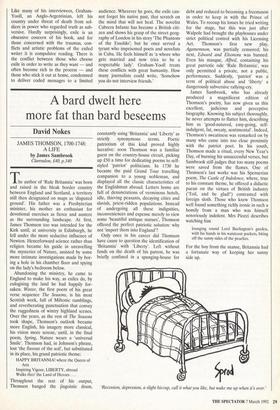A bard dwelt here more fat than bard beseems
David Nokes
JAMES THOMSON, 1700-1748: A LIFE by James Sambrook Clarendon, £40, p.340 he author of 'Rule Britannia' was born and raised in the bleak border country between England and Scotland, a territory still then designated on maps as 'disputed ground'. His father was a Presbyterian minister, his mother an enthusiast for devotional exercises as fierce and austere as the surrounding landscape. At first, James Thomson too was intended for the Kirk until, at university in Edinburgh, he fell under the more seductive influence of Newton. Henceforward science rather than religion became his guide in unravelling the mysteries of Nature, assisted by some more intimate investigations made by bor- ing a hole in his chamber floor and spying on the lady's bedroom below.
Abandoning the ministry, he came to England to make his way, as exiles do, by eulogising the land he had happily for- saken. Winter, the first poem of his great verse sequence The Seasons, is his most Scottish work, full of Miltonic rumblings, and reverberating punctuation that convey the ruggedness of wintry highland scenes. Over the years, as the rest of The Seasons took shape, Thomson's outlook became more English, his imagery more classical, his vision more serene, until, in the final poem, Spring, Nature wears a 'universal Smile'. Thomson had, in Johnson's phrase, lost 'the flavour of the soil', but substituted in its place, his grand patriotic theme:
HAPPY BRITANNIA! where the Queen of Arts Inspiring Vigour, LIBERTY, abroad Walks thro' the Land of Heroes ...
Throughout the rest of' his output, Thomson banged the jingoistic drum, constantly using 'Britannia' and 'Liberty' as strictly synonymous terms. Poetic patriotism of this kind proved highly lucrative: soon Thomson was a familiar guest on the country-house circuit, picking up £50 a time for dedicating poems to self- styled 'patriot' politicians. In 1730 he became the paid Grand Tour travelling companion to a young nobleman, and displayed all the classic characteristics of the Englishman abroad. Letters home are full of denunciations of verminous hotels, idle, thieving peasants, decaying cities and slavish, priest-ridden populations. Instead of undergoing all these indignities, inconveniences and expense merely to view some 'beautiful antique statues', Thomson offered the perfect patriotic solution: why not 'import them into England'?
Only once in his career did Thomson have cause to question the identification of 'Britannia' with 'Liberty'. Left without funds on the death of his patron, he was briefly confined in a spunging-house for
debt and reduced to becoming a freemason in order to keep in with the Prince of Wales. To recoup his losses he tried writing for the stage, but this was just after Walpole had brought the playhouses under strict political control with his Licensing Act. Thomson's first new play, Agamemnon, was partially censored; his next, Edward and Eleonora was banned. Even his masque, Alfred, containing his great patriotic ode 'Rule Britannia', was only permitted a private, not a public, performance. Suddenly, `patriot' was a term of political abuse and 'liberty' a dangerously subversive rallying-cry.
James Sambrook, who has already produced a magnificent edition of Thomson's poetry, has now given us this excellent, judicious and perceptive biography. Knowing his subject thoroughly, he never attempts to flatter him, describing him as 'good-natured, easy-going, self- indulgent, fat, sweaty, sentimental'. Indeed, Thomson's sweatiness was remarked on by many who came into too close proximity with the patriot poet. In his youth, Thomson made a ritual, every New Year's Day, of burning his unsuccessful verses, but Sambrook still judges that too many poems were saved from the flames. One of Thomson's last works was his Spenserian poem, The Castle of Indolence, where, true to his constant theme, he offered a didactic paean on the virtues of British industry ('Toil, and be glad!') contrasted with foreign sloth. Those who knew Thomson well found something richly ironic in such a homily from a man who was himself notoriously indolent. Mrs Piozzi describes watching him
lounging round Lord Burlington's garden, with his hands in his waistcoat pockets, biting off the sunny sides of the peaches.
For the boy from the manse, Britannia had a fortunate way of keeping her sunny side up.
Recession, depression, a slight hiccup, call it what you like, but wake me up when it's over.'


















































 Previous page
Previous page